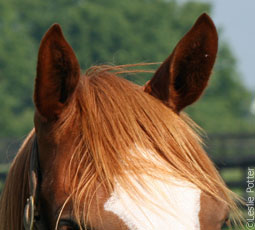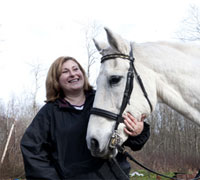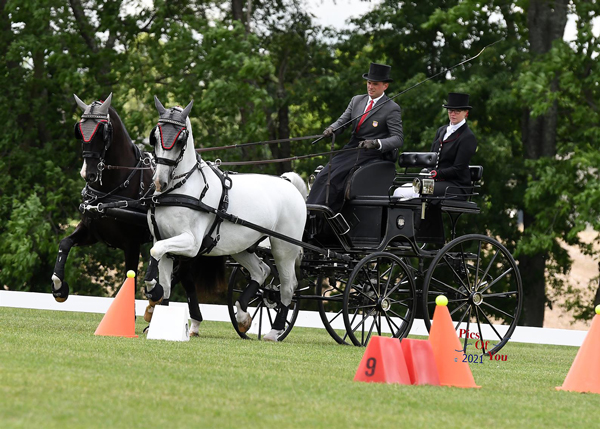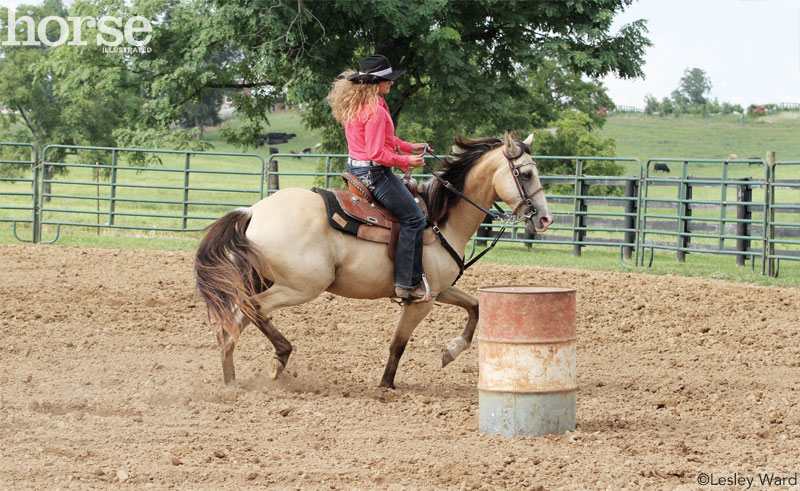 |
| How does your horse react to the sound of your voice? Photo: Leslie Potter |
When interacting with horses, will they respond better to a high-pitched voice, or low-pitched? Do they recognize what humans would consider to be a stern tone of voice rather than a soothing one? Most horse owners will report anecdotally that their horses know when they’re being scolded or when they’re being praised based on tone, and some will say their horse has a preference for a high- or low-pitched voice. But is there any proof?
Researchers at the University of Guelph in Ontario, Canada and Agrocampus Rennes in France performed a study to find out if different manners of speaking in humans made any difference in horse behavior. Their subjects were eight draft horses. Each horse was turned loose in a round pen for five minutes while researchers documented baseline statistics about their gait, head height, and ear and body position in relation to a human by the pen. The horses’ heart rates were also measured.
Once those measurements had been recorded to determine a baseline for each horse, 10 seconds of a recorded human voice was played while a human familiar to them was positioned near the pen. The voices were classified as a pleasant voice, low tone; pleasant voice, high tone; stern voice low tone; stern voice, high tone.
When no human or sound was present, the horses tended to keep their head at the lowest position, and all of the subjects raised their head when the human or sound was present. The voices categorized as pleasant was more likely to cause the horses to position their bodies toward the human.
The greatest effect on heart rate occurred when the stern, low voice was played. This casued heart rate elevation, indicating that horses may, in fact, recognize a scolding tone.
“We’ve shown that horses do in fact display different physiological and behavioural responses to different tones and voice,” said Katrina Merkies of the University of Guelph. “So horses are able to discriminate between different tones or qualities of voice. However, it’s not clear if the horse is interpreting or responding to the tone of voice alone, or if it’s looked at in combination-both tone of voice and the human’s body language. Which is the more salient clue to the horse? That certainly warrants further study.”
This research was presented at the 2013 conference of the International Society for Equitation Science.






That is interseting. I never thought about it before. I ‘ ll bet they know when they’ re scolded and being rewarded.
My farrier has a deep voice, and is often scolding the horses, as soon as they hear his voice, they start acting up. My voice seems to keep them calmer, with some reassure rubs and scratches on their neck and faces.
Being calm with a calm voice gets the best results.
I noticed very quickly how my mare responded to changes in my voice, and when other people are around. If I speak in a higher tone voice, she moves her ears back and forth, and tends to move a little faster than when I’m quiet or talking in a low tone.
great info
interesting
Not only do they respond to different tones but they learn what our different tones mean when we repeat them often.
I sure agreed with this article. My horses respond to my voice, quiet and slow, than my husbands load and deep.
They also will respond to car or truck sounds. My horses know if its my husbands truck coming to the corrals or if its my car and they respond differently. For me I get the greeting and for my husband they just look at him it is funny at times.
I have to agree with this article, Also with the truck and car comment ….they know their “people”. They know!
I am a horse masseur , I absolutely know that tone of voice is my of my most valuable tools in getting horses to trust me with the work I do on their bodies and touching them even when they are sore
I have not come from a horses background so have had to learn everything I know from horses and speaking in tones to them is what allows me to connect with them and fir them to be comfortable with me at all times , low and patient and loving is best